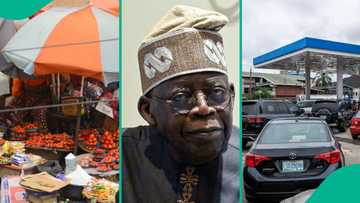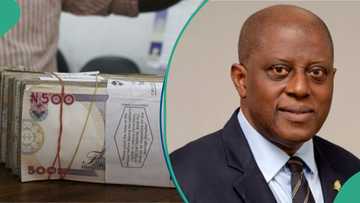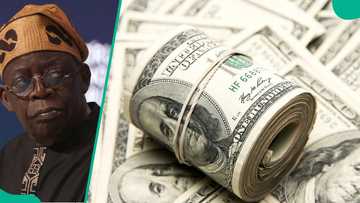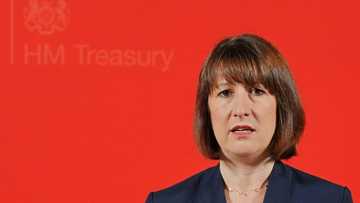Explainer: All You Need to Know About Forex Windfall Tax Tinubu Imposed on Banks
Legit.ng journalist Victor Enengedi has over a decade's experience covering Energy, MSMEs, Technology and the Stock Market.
Don't miss out! Join Legit.ng's Sports News channel on WhatsApp now!
In line with its economic reforms, President Bola Ahmed Tinubu's administration has proposed a one-time windfall levy targeting the significant profits made by Nigerian banks from exchange rate fluctuations.
The federal government aims to modify the Finance Act by imposing this tax on the extraordinary foreign exchange gains banks have accumulated.

Source: UGC
This initiative reflects a dedication to distributing the financial advantages from recent reforms more equitably, focusing on national development while ensuring that everyday citizens are not subjected to additional tax pressures.
According to reports, If implemented, the tax could reportedly generate at least N2 trillion for the Nigerian government.
PAY ATTENTION: Click “See First” under the “Following” tab to see Legit.ng News on your Facebook News Feed!
However, this initiative has sparked intense debate among stakeholders in the banking sector, with opinions divided between those who support the tax's implementation and those who oppose it.
What is windfall tax?
According to experts, windfall taxes are levies imposed by governments on specific industries when favourable economic conditions result in significantly higher-than-normal profits.
These taxes target entities that experience sudden and substantial financial gains, often referred to as "windfalls."
Such unexpected profits may arise from factors like market shifts, the discovery of natural resources, or changes in government policy.
The main goal of windfall taxes is to capture a portion of these extraordinary profits—considered to exceed typical returns—for public benefit.
Governments argue that these gains are not solely the result of the taxed entities' efforts but are influenced by external factors, justifying their redistribution for the greater good.
Windfall tax is not new
The idea of windfall taxes is not exclusive to Nigeria. Around the world, various countries have adopted windfall taxes in different forms, resulting in diverse outcomes.
These taxes are commonly used as a tool to regulate and redistribute unexpected profits.
In May 2022, the United Kingdom implemented a 25% windfall tax on energy profits, which was later raised to 35% in January 2023.
Similarly, on August 8, 2023, Italy introduced a windfall tax targeting profits made by banks due to high interest rates, aiming to provide relief to mortgage holders.
Benefits of windfall tax
The recently introduced Windfall Tax under Nigeria’s Finance Act offers several advantages for the country.
By reallocating these unexpected profits, the tax will direct resources toward essential public services, such as infrastructure, healthcare, and education.
This redistribution is anticipated to enhance public facilities, improve the quality of healthcare and education, and help reduce economic inequalities.
Additionally, the funds are expected to boost job creation and foster economic growth.
Key points of proposed Nigeria's windfall tax

Read also
Petrol, cooking gas, electricity Tariff: List of 7 items whose prices have gone up under Tinubu
- The Bill imposes a windfall tax of 50% on Nigerian banks’ realized profits from all foreign exchange (FX) transactions within the 2023 financial year.
- Federal Inland Revenue Service (FIRS) shall assess, collect, account, and enforce payment of the tax.
- Nigerian banks liable to pay the tax may enter into a deferred payment agreement with FIRS, which must be executed on or before December 31, 2024.
- Nigerian banks that fail to pay the tax to FIRS and have not executed a deferred payment agreement before December 31 2024, shall be liable to pay the tax, plus a penalty of 10% of the tax not paid per annum, plus interest at the prevailing Central Bank of Nigeria (CBN) minimum rediscount rate.
- The principal officers of such a defaulting bank may also be imprisoned for a period of not more than 3 years.
Advocates and opposition of windfall tax
The introduction of the windfall tax by the FG has stirred up controversial views in the banking sector. Like any government-imposed tax, windfall taxes generate a split between supporters and critics.
While bank chairmen like Femi Otedola and Tony Elumelu approve of the tax, others, like the Bank Directors Association of Nigeria (BDAN), have opposed it.
Proponents argue that these taxes encourage fair wealth distribution and help fund essential public services or infrastructure projects.
On the other hand, opponents contend that such taxes discourage companies from pursuing profit and believe that profits would be better reinvested by businesses to foster innovation, ultimately benefiting society as a whole.
Largest commercial banks in Nigeria by assets
In related news, Legit.ng reported that Nigeria's tier-one banks' combined total asset value increased to N116.80 trillion as of the end of the first quarter of 2024.
The figure represented a 23.81% or N22.46 trillion increase compared to N94.33 trillion as of December 2023.
Legit.ng analysis showed that combined assets grew by N22.46 trillion among the tier-one banks surveyed in the last three months.
Proofreading by James, Ojo Adakole, journalist and copy editor at Legit.ng.
PAY ATTENTION: Unlock the best of Legit.ng on Pinterest! Subscribe now and get your daily inspiration!
Source: Legit.ng






